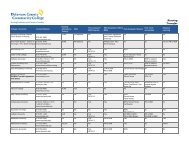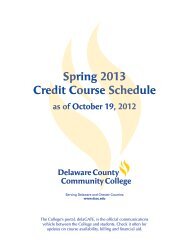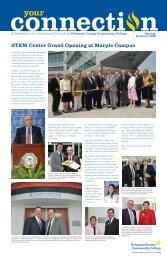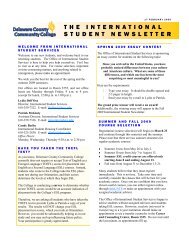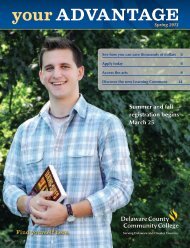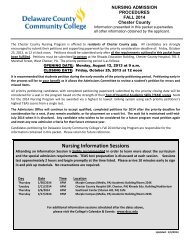2010 Catalog - Delaware County Community College
2010 Catalog - Delaware County Community College
2010 Catalog - Delaware County Community College
You also want an ePaper? Increase the reach of your titles
YUMPU automatically turns print PDFs into web optimized ePapers that Google loves.
136 COURSE DESCRIPTIONS<br />
MCR 123<br />
Microsoft Excel<br />
This is a hands-on course in Microsoft Excel, the Microsoft<br />
Office spreadsheet package.Students learn how to organize<br />
data, complete calculations, make decisions and graph data<br />
to develop professional-looking reports.<br />
Upon completion of this course, the student should be<br />
able to:<br />
• Describe Microsoft Excel.<br />
• Formatting worksheets and workbooks.<br />
• Create a worksheet and embedded chart in Microsoft Excel.<br />
• Use formulas in Excel.<br />
• Format and create charts in Excel.<br />
1 Credit<br />
MCR 124<br />
Microsoft Access<br />
This is a hands-on introductory course in Microsoft Access.<br />
In this course, students learn to create a database query<br />
a database.<br />
Upon successful completion of this course, students<br />
should be able to:<br />
• Describe databases and database management systems.<br />
• Create a database using Design and Database Views.<br />
• Creating and modifying table data.<br />
• Creating and modifying database forms.<br />
• Query a database using the Select Query Window.<br />
1 Credit<br />
MCR 125<br />
Microsoft Powerpoint<br />
This is a hands-on course in Microsoft's presentation<br />
graphics software, PowerPoint. Students learn to produce<br />
professional-looking presentation materials for overhead<br />
transparencies and electronic presentations using a projection<br />
device attached to a personal computer. Students<br />
also learn to create paper printouts, outlines, speaker<br />
notes and audience handouts.<br />
Upon successful completion of this course, students<br />
should be able to:<br />
• Describe Microsoft PowerPoint.<br />
• Use a design template and style checker to create a<br />
presentation.<br />
• Enhancing presentations using formatting techniques.<br />
• Use Outline View and Clip Art to create an electronic<br />
slide show.<br />
• Import Clip Art from the Microsoft Clip Gallery live<br />
Web site.<br />
• Work with masters to display professional and<br />
functional presentations.<br />
1 Credit<br />
MCR 222<br />
Advanced Microsoft Word<br />
This hands-on course focuses on the more advanced<br />
features of Microsoft Word.In this course, students learn<br />
to create reports with a title page and tables, to generate<br />
form letters, mailing labels and envelopes, and to create<br />
a professional newsletter.<br />
Upon successful completion of this course, students<br />
should be able to:<br />
• Create a document that has a title page and tables.<br />
• Create a document that uses clip art and the Draw Table.<br />
• Generate form letters using mail merge.<br />
• Create a data source.<br />
• Generate mailing labels from a data source.<br />
• Generate envelopes from a data source.<br />
• Create a professional newsletter.<br />
Prereq. MCR 122<br />
1 Credit<br />
MCR 223<br />
Advanced Microsoft Excel<br />
This hands-on course teaches students the advanced<br />
features of Microsoft Excel.<br />
Upon successful completion of this course, students<br />
should be able to:<br />
• Create templates and workbooks using Excel.<br />
• Build a data table to analyze data in a worksheet.<br />
• Create a worksheet database.<br />
• Integrate a Word document through imbedding into<br />
an Excel document.<br />
Prereq. MCR 123<br />
1 Credit<br />
MCR 224<br />
Advanced Microsoft Access<br />
This hands-on course teaches students the advanced<br />
features of Microsoft Access.Topics include creating a<br />
query and using OLE fields on a form.<br />
Upon successful completion of this course, students<br />
should be able to:<br />
• Create a query for a report.<br />
• Create date, memo and Ole fields on a form.<br />
• Create and run a macro.<br />
Prereq. MCR 124<br />
1 Credit<br />
(MPT)Municipal Police Training<br />
MPT 100<br />
Introduction to Law Enforcement<br />
This course teaches the police candidate the role of a<br />
police officer in the community. It defines police power<br />
and authority, the potential impact of its misuse on the<br />
community as well as social control. Understanding the<br />
function of the police within the context of the United<br />
States Constitution will also be addressed.<br />
Upon successful completion of this course, students<br />
should be able to:<br />
• Explicate the social control of police behavior.<br />
• Describe and apply principles of police discretionary<br />
conduct.<br />
• Analyze and describe the role of personal and<br />
professional conduct.<br />
• Describe the place of police in our society.<br />
• Show the relationship of police conduct to an<br />
ethical code.<br />
• Detail the difference between civil and criminal behavior.<br />
• Describe the role of public and community relations in<br />
police work.<br />
• Delineate the role of law and administration of law in<br />
our society.<br />
• Depict penology in Pennsylvania.<br />
2 Credits 2 Weekly Lecture Hours<br />
MPT 101<br />
Professional Development<br />
This course teaches appropriate skills for the maintenance<br />
of mental and physical well-being and appropriate<br />
professional standards of conduct. It provides relevant<br />
theory and instruction numerous areas such as the<br />
elements of physical fitness and its relationship to police<br />
work. Moreover, the physical and psychological benefits<br />
of physical fitness and the importance of establishing a<br />
healthy lifestyle in specific areas of physical training,<br />
nutrition and weight control will also be addressed.<br />
Upon successful completion of this course, students<br />
should be able to:<br />
• Identify the use of force continuum and explain its<br />
levels, constraints and cues.<br />
• Identify circumstances where use of non-deadly force is<br />
authorized by law.<br />
• Identify circumstances where use of deadly force is<br />
authorized by law.<br />
• Demonstrate techniques used to subdue persons using<br />
locks, grips, holds, etc.<br />
• Describe stress-inducing situations that can affect the<br />
conduct of individual police officers.<br />
• Depict police leadership traits and techniques.<br />
• Analyze psychological barriers to confrontation by police<br />
of their own emotional and psychological problems.<br />
• Describe the effect on an officer's emotional state when<br />
exercising police power and authority.<br />
• Demonstrate physical conditioning by performing pushups,<br />
sit-ups, and a mile and one-half run, weight-lifting<br />
and sit-and-reach exercises.<br />
4 Credits 2 Weekly Lecture Hours<br />
2 Weekly Laboratory Hours<br />
MPT 102<br />
Law and Procedures<br />
This course teaches the police officer candidate to<br />
recognize and cite Pennsylvania criminal statutes, the<br />
rules of criminal procedures and applicable Constitutional<br />
provisions. Distinctions between criminal and civil law,<br />
federal, state and local statutes will be thoroughly<br />
addressed. In addition, topics of discussion will include,<br />
but will not be limited to, understanding the basic laws<br />
and rules that govern the power, authority, and jurisdiction<br />
of police officers in Pennsylvania.<br />
Upon successful completion of this course, students<br />
should be able to:<br />
• Analyze the U.S. and Pennsylvania Constitution<br />
provisions that provide the legal basis for the exercise<br />
of police power.<br />
• Provide the legal basis for the exercise of police power.<br />
• Recognize and cite provisions of Pennsylvania statutes<br />
that define criminal conduct.<br />
• Apply rules and statutory provisions for arrest, search<br />
warrants, electronic surveillance and bail.<br />
3 Credits 3 Weekly Lecture Hours<br />
MPT 103<br />
Law and Procedures II<br />
This course is a continuation of Law and Procedures I<br />
which teaches the police officer candidate to recognize<br />
and cite Pennsylvania criminal statute, the rules of<br />
criminal procedures and applicable Constitutional provisions.<br />
Instruction in this course will be on theory and skills<br />
associated with the significant steps in the arrest, postarrest,<br />
pretrial, trial and post-trial processes.<br />
Upon successful completion of this course, students<br />
should be able to:<br />
• Recognize and cite provisions of the Mental Health Act,<br />
Protection from Abuse Act, Liquor Control Act, and<br />
Crime Victims Compensation Act.<br />
• Identify major provisions of the Controlled Substance<br />
Act pertinent to their enforcement capacity.<br />
• Identify the major provisions of the cell phone laws.<br />
• Recognize provisions of environmental laws, safety<br />
concerns, and jurisdictional issues.<br />
• Identify circumstances when a search incident to arrest<br />
is authorized.<br />
• Describe a suppression hearing. Identify ethical<br />
considerations in search and seizure.<br />
• Identify consequences of conducting an unlawful search.<br />
• Define the legal requirements to search a person,<br />
house, etc.<br />
• Define a lawful frisk.<br />
Prereq. MPT 102<br />
3 Credits 3 Weekly Lecture Hours<br />
MPT 104<br />
Vehicle Code<br />
This course is designed to provide the student with<br />
relevant theory and skills in analyzing the provisions of<br />
the Pennsylvania Motor Vehicle Code and decisions of<br />
operating under the influence detection. Sources of<br />
standards for armed pedestrian behavior and the<br />
function of law enforcement within the context of<br />
the highway transportation system will be defined.<br />
DELAWARE COUNTY COMMUNITY COLLEGE




